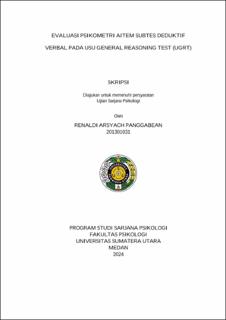| dc.description.abstract | This research utilizes a descriptive quantitative method and employs a convenience sampling technique. The aim of this study is to evaluate the Deductive Verbal items, specifically the Proposition subtest (DV 1) and Syllogism subtest (DV 2), in the USU General Reasoning Test (UGRT). The psychometric evaluation of the deductive verbal items employs Rasch modeling, which includes the analysis of reliability coefficients, validity coefficients based on internal structure, item measure analysis, item fit, Wright map, and unidimensionality. This study uses secondary data obtained from participants of the P3M test at the Faculty of Psychology, Universitas Sumatera Utara. The UGRT was administered to 824 samples aged 15 to 60 years, divided into 4 sets (A, B, C, D). The psychometric results show that the person reliability coefficient for the DV 1 subtest in sets A, B, C, and D are -0.60, -0.94, -1.63, and -1.72 respectively, while for the DV 2 subtest, the person reliability coefficients are -1.07, -0.77, 1.25, and -1.47 respectively, categorized as weak for all sets. The item reliability coefficients for the DV 1 and DV 2 subtests range from 0.99, 0.92, 0.82, to 0.96. Validity coefficients, using 0.5 < MNSQ < 1.5; -2.0 < ZSTD < 2.0; and 0.4 < Pt Mean Corr < 0.85, show that 25 items in DV 1 and 27 items in DV 2 meet the fit criteria. However, in DV 2, one item, item 7 in set D, is categorized as unfit. The item difficulty range in DV 1 is from 3 to 10, and in DV 2 from 4 to 9. The unidimensionality of the DV 1 and 2 subtests in each set averages above 20%, indicating that the test meets the requirements. The results of this study indicate that the test validity is predominantly good; however, further evaluation is needed, particularly for the unfit item in the DV 2 subtest. Additionally, a re-testing with a larger sample size is necessary to enhance the reliability of the UGRT. | en_US |


